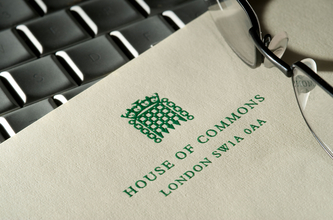The committee on standards has published final recommendations for a new package of reforms surrounding lobbying rules and conflicts of interest in the House of Commons, and make other improvements to the standards system in the wake of the Owen Paterson scandal.
However the report does not propose capping the time MPs spend in any second jobs, a move several ministers previously signalled support for.
The report also included a new Code of Conduct for MPs and an updated Guide to the Rules to support them.
The committee published initial proposals in November last year. Following a consultation with experts, academics and MPs, the committee is now making final recommendations to the House to consider.
Among the recommendations included in the committee’s report are: tightening the lobbying rules so that MPs can neither initiate nor participate in proceedings or approaches to Ministers, other MPs or officials that seek to confer a material benefit on someone paying them, by removing the existing distinction in the rules between initiating and participating in a proceeding or an approach.
Removing the Ministerial exemption, Ministers must register all benefits and hospitality on the same basis as other Members.
An outright ban on MPs providing paid parliamentary advice, consultancy or strategy services.
MPs must have a written contract for any outside work, which makes explicit that their duties cannot include lobbying Ministers, Members or public officials, or providing advice about how to lobby or influence Parliament. The contract must be provided to the Commissioner on request.
Clarifying and tightening the criteria for the ‘serious wrong exemption’ in the lobbying rules to put an end to this being used as a loophole.
Making the Register of Members’ Interests more transparent and searchable – as a matter of urgency.
Introducing a new ‘safe harbour’ provision whereby MP who seek advice from the relevant authorities and follow it cannot be held responsible for inadvertent breaches.
Endorsing the Seven Principles of Public Life (the ‘Nolan principles’), and for the first time providing customised descriptions of how they apply to MPs.
Spelling out in the description of the ‘Leadership’ Principle that MPs should display anti-discriminatory attitudes and behaviours. Like other principles this would be aspirational, and note an enforceable rule that could be investigated by the Commissioner. (Four of the seven lay members of the committee have attached an ‘opinion’ to the report, welcoming the inclusion of this provision but arguing that the House should go further and call for Members to “set an example of anti-discriminatory attitudes and behaviours through the demonstration of anti-racism, anti-misogynistic attitudes, inclusion and diversity”.)
The second half of the report sets out the committee’s response to the Ryder review of fairness in the House’s system. This review by a distinguished former Appeal Court judge, Sir Ernest Ryder, was commissioned by the committee and published in February.
Sir Ernest Ryder in his review endorses many aspects of the existing standards system and concludes that the present inquisitorial procedure for standards inquiries is fair and compliant with the European Convention on Human Rights. He proposes some ways in which the system could be improved including establishing a formal appeals system and some changes to the role of the Parliamentary Commissioner for Standards. The committee accept all of Sir Ernest’s recommendations and set out in detail a plan for implementing them.
One recommendation in the Ryder review is that the House should endorse a single document setting out its standards procedures, plainly and accessibly written. The committee will publish a draft of this ‘Procedural Protocol’ shortly. It will then invite the House to decide on its full package of proposals for reforming the standards system.
In addition, the committee announces plans for an annual cycle of scrutiny of parliamentary standards culminating each year in a debate in the House which will be an opportunity for any further changes to the system to be made on a rolling basis.
The committee also announce two inquiries to be held later in 2022, into “the tone of political debate, intimidation, misogyny and how parties conduct their campaigning” and into “how the Code and its values could be more effectively communicated to Members”, including “the provision of adequate and appropriate training. Detail terms of reference for these inquiries will be issued in due course.
Chair of the committee, Chris Bryant MP, said: “The last year has shown that the public cares passionately about standards in parliament – and so do MPs. Our report sets out a package of robust new measures to uphold and strengthen standards in Parliament by improving transparency, tackling conflicts of interest, tightening the rules on improper lobbying and providing an enhanced means of appeal.
“These proposals, if accepted, will not only improve checks and balances on MPs, and shine a light on any wrongdoing, but will also provide new clarity and support to MPs to avoid inadvertent breaches of the rules.
“These proposals will go to the House for a final decision. I strongly urge all colleagues to read the detailed report in full and support these measures. Every generation of MPs holds membership of the House in trust for the next generation. It can either burnish the House’s reputation or tarnish it.”
During the inquiry, the committee also received extensive feedback on a proposal to ban MPs from making “unreasonable and excessive personal attacks in any medium”, on the grounds of free speech. The committee noted these concerns, committing to return to consider the matter further as part of a wider inquiry in the autumn investigating the tone of political debate, intimidation and misogyny in public life.
The full report “New Code of Conduct and Guide to the Rules: promoting appropriate values, attitudes and behaviour in Parliament”, including any annexes will be available to view here on the committee website once the embargo lifts.












